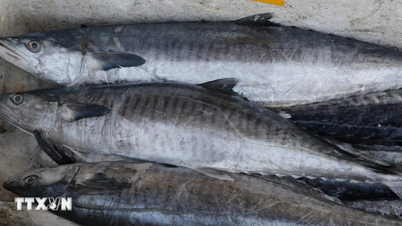Blood pudding contains a lot of iron, a very important component for blood formation, but it's not good for everyone to eat, and it can even pose many risks.
On September 17th, Dr. Nguyen Quoc Nhat, Deputy Head of the Chemotherapy Department at the National Institute of Hematology and Blood Transfusion, stated the above, adding that iron is a very important component for blood formation. Therefore, blood pudding, which is rich in iron, can help improve anemia in cases where the cause of anemia is iron deficiency.
However, anemia is caused by many factors, and iron deficiency is just one of them. Iron supplementation should only be done under a doctor's supervision. "Before taking any medication or using any food supplement to increase iron, you should see a doctor to find the cause of your anemia," Dr. Nhat said.
In some cases, anemia is accompanied by iron overload (typically anemia due to thalassemia). In such cases, taking iron supplements or eating iron-rich foods will worsen the condition. "Therefore, eating blood pudding is not good for everyone," said Dr. Nhat.
A crucial issue that many people often overlook is that raw blood pudding, which is not thoroughly cooked, always carries the risk of bacterial and parasitic infections. Therefore, doctors advise everyone to consider this before eating, especially patients who have been advised by their doctors to eat cooked food and drink boiled water.
In addition to adhering to the treatment plan, patients with iron-deficiency anemia need a proper diet to help their bodies recover quickly.
Dr. Phan Kim Dung, Head of the Nutrition and Dietetics Department at the National Institute of Hematology and Blood Transfusion, stated that patients need to ensure a balanced diet that meets their body's essential nutrient needs, balancing animal and plant proteins. Improving meal quality requires ensuring sufficient iron intake according to recommended daily intake (based on age and gender).
Increase your intake of protein-rich foods containing iron, folic acid, and vitamins, especially B vitamins. Animal protein sources include red meats such as beef, veal, liver, blood, pork, and turkey. Aim for 45-60g of protein per day, equivalent to 200-300g of meat per day.
Eat seafood 2-3 times a week, including mackerel, salmon, and shellfish such as oysters, clams, and snails. In addition, adults should eat 2-3 eggs per week. Eggs are rich in nutrients such as protein, lipids, and carbohydrates. The egg yolk, in particular, contains a significant amount of iron, calcium, zinc, and vitamin A.
Plant-based protein sources include dark green leafy vegetables and cruciferous vegetables such as spinach, watercress, and broccoli. A daily intake of 300-400g (equivalent to one bowl of vegetables per meal) is recommended. Legumes and nuts such as peas, soybeans, peanuts, cashews, and almonds are also beneficial.
Ripe fruits and berries such as cherries, strawberries, grapes, blueberries, pomegranates, etc., are not only rich in iron but also high in vitamin C, which improves blood flow and enhances iron absorption. It is recommended to eat 100-200g of ripe fruit per day.
Limit your consumption of tea and coffee, as they contain tannins that inhibit iron absorption. Supplement with iron or multivitamins as directed by your doctor.
Le Nga
Source link













































































































Comment (0)